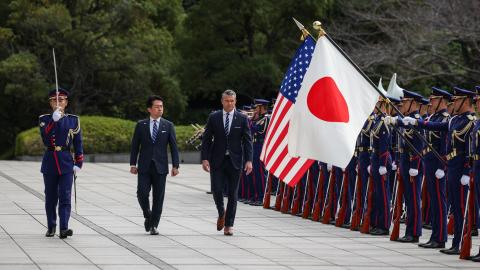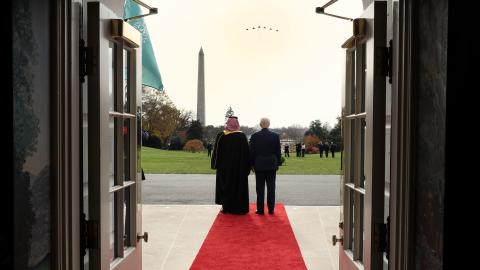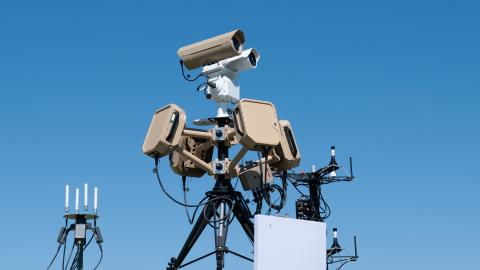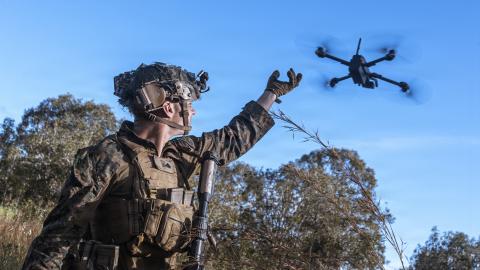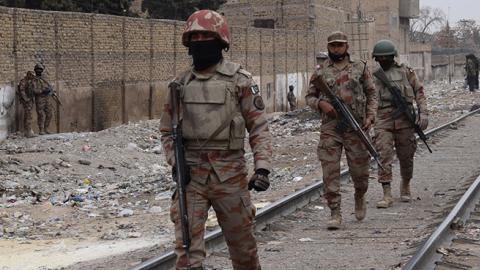p(firstLetter). Less than three months after President Trump promised in his New Year’s Day tweet that the U.S. government would not accept “lies and deceit” from Pakistan, some U.S. military leaders are ready to praise the half-hearted steps Pakistan has taken against terrorist safe havens. If past experience is any guide, the use of softer language by American generals in the hope of strengthening military-to-military ties will only encourage Pakistani generals to assume that their two-track policy of reassuring Americans of cooperation while maintaining support for jihadi terrorists is working.
Last month, CENTCOM Commander General Joseph Votel told a hearing of the U.S. House of Representatives that he saw “positive indicators” that Pakistan is becoming more responsive to U.S. concerns about its abiding militant safe havens on its territory. He qualified his statement by remarking that Islamabad’s actions do “not yet equal the decisive action that we would like to see them take in terms of a strategic shift.” But General Votel’s words still sufficed to reassure Pakistan’s military leaders, who claim that, after several false starts, this time they really are on the verge of a policy transformation.
Pakistani media have been reporting that the army chief, General Qamar Bajwa, wants Pakistan to continue along the path of democracy, end all support and tolerance for jihadi militancy and terrorism, and develop better relations with Afghanistan and India. But all evidence on the ground suggests that the “Bajwa Doctrine” is not fundamentally different from the “Kayani Doctrine,” named after General Ashfaq Kayani who served as Pakistan’s army chief from 2007 to 2013. And the “Kayani Doctrine” did not differ in substance from the policies and premises espoused by military commanders before Kayani, notably General Pervez Musharraf, who seized power in a military coup in 1999 and ruled Pakistan for nine years.
The training and education of Pakistan’s military officers tends to cast their minds in a similar mold, and that mold remains mostly unaltered by changing realities around them. Georgetown University’s Professor Christine Fair makes that point in her 2014 analysis of writings by Pakistan army officers: “Fighting to the End”: The Pakistan Army’s Way of War.
And while General Bajwa may not want to follow in the footsteps of Pakistan’s long list of coup-making commanders, he cannot avoid politics even if he wants to, for he presides over an officer corps that spends more time thinking about politics than about purely professional matters. (Aqil Shah proves that thesis methodically in his 2014 empirical study, The Army and Democracy: Military Politics in Pakistan.)
Notwithstanding a genuine personal distaste for getting directly embroiled in politics, every Pakistani commander must give voice to his institution’s views and beliefs, most of which have remained unaltered since the ascendance in 1951 of General (later Field Marshal) Ayub Khan as the first indigenous Muslim commander of the army that Pakistan inherited from the British Raj.
In that worldview, jihadi terrorists serve as a force multiplier for Pakistan against a permanently hostile India and an Afghanistan whose sense of history prevents it from becoming subservient to 70-year old Pakistan, despite the latter’s much larger population and economy. The only terrorists Pakistan needs to oppose, according to this template, are the ones who attack inside Pakistan; those that menace the Americans in Afghanistan or Indians in Jammu and Kashmir are more than tolerable.
Yet Pakistan’s generals need the United States and China to help make up for deficiencies in the nation’s economic performance and as suppliers of military hardware. Pakistani policy toward China is not particularly problematic, since a shared suspicion of India makes it Pakistan’s strategic partner—and geography ordains that this circumstance will not change. The United States, on the other hand, has scruples that coincide with its interests and so must be treated as a transactional ally—as well as an ally likely to come and go from the region as it sees fit. Only with Washington, then, do the generals need to practice their discipline of duplicity as diplomacy.
Plenty of U.S. officials have by now caught on to the Pakistani generals’ drill. So a few days after General Votel’s nod to the Pakistani military, a senior U.S. official had to clarify that the “United States has not yet seen Pakistan take significant steps to clamp down on the Afghan Taliban and the Haqqani network militant groups.” According to this official, Islamabad had failed to take “the kind of decisive and irreversible action” Washington had asked for to help with the war in Afghanistan. As for the “positive indicators” mentioned by General Votel, and later by Defense Secretary James Mattis, the official saw these as attempts by Pakistan “to appear responsive” to American requests. The Pakistanis “have done the bare minimum to appear responsive” to U.S. government requests—the sort of tactical cooperation that has misled Americans into trusting Pakistan in the past, and that has been a key factor in prolonging the war in Afghanistan.
In other words, this has all happened before. In December 2008, for example, then-Chairman of the U.S. Joint Chiefs of Staff, Admiral Michael Mullen, saw a positive trajectory in relations with the Pakistan military, based on what seemed like encouraging steps against terrorists and in relation to Afghanistan. Mullen put his faith in the military-to-military relationship just as General Votel seems to be doing now, and he engaged in intense interaction with General Kayani via 26 in-person meetings, punctuated by numerous telephone conversations.
Kayani managed to sell Mullen on the idea that change was around the corner in Pakistan’s policies as well as its military’s thinking. But three years later Admiral Mullen realized that he had been wasting his time. By the beginning of 2011, Mullen’s frustration with his Pakistani interlocutors spilled over in public statements. Just days before his retirement in September 2011, Mullen told a Senate Armed Services Committee hearing that Pakistan’s spy agency had played a direct role in supporting terrorists who had attacked the American Embassy in Kabul a week earlier. According to Mullen, “the Haqqani network acts as a veritable arm of Pakistan’s Inter-Services Intelligence agency,” and “with ISI support, Haqqani operatives planned and conducted that truck bomb attack, as well as the assault on our embassy.”
A decade after Admiral Mullen began his effort to try and change Pakistan’s strategic calculus, his eventual disappointment should not be replaced by General Votel’s unqualified optimism. After all, the Pakistan military’s priorities in relation to Afghanistan have not changed much, nor has its core belief system. So it is worth remembering that, as of 2013, General Kayani’s approach to Afghanistan was described as being based on four pillars: “American troops would have to withdraw from Afghanistan; reconciliation among Afghan factions is not possible without the ISI; the Jalalabad-Torkham-Karachi route remains the most viable for withdrawing American forces; and India cannot be allowed to encircle Pakistan.”
None of those considerations has changed. The Pakistanis still expect U.S. troops eventually to withdraw from Afghanistan and seem prepared to leverage their control of ground and air lines of communication into Afghanistan. Unless the U.S. and Afghan governments can figure a way to negotiate directly with Taliban leaders and commanders, the ISI continues to believe in its sway over a future peace process. The fear of encirclement by India is also embedded in Pakistan’s national psyche and is maintained with a steady dose of hyper-nationalist propaganda, this despite the fact that it has since been many years since Indian attitudes toward Pakistan could justify such a view.
For Pakistan to move toward a drastic transformation, it is essential that Pakistanis should have the option to discuss alternative futures for their country, including views on Afghanistan and India that do not paint them as permanent threats. Unfortunately, one of the most consistent themes in the thinking of Pakistan’s generals remains the belief that contending ideas about Pakistan’s direction threaten Pakistan’s survival and stability. Pluralism and open debate are not in their mental manuals. They are sure that the army is better suited than civilian institutions or venal politicians, of which admittedly there are many, when it comes to defining Pakistan’s national interest.
Until signs of change in that thinking appear, American civil and military leaders should withhold praise for “positive” developments in Pakistan’s terrorism policies. That praise only postpones Pakistanis’ much-needed reflection over the faulty worldview that has shaped Pakistan’s flawed policies.
